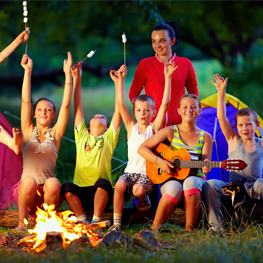
Summer camp offers all kinds of fun and character building experiences for kids of any age. Whether you’re looking for a few hours of entertainment or weeks of intentional skill building for your child, you can find it at camp.
Ages 3 to 5
Day camps offer the perfect opportunity for young kids to experience time away from parents and explore new activities. Camps for preschool children typically focus on free play, sharing with others, group games (inside and outside), and simple arts and crafts. If you’re sending your child to camp for the first time, make sure the schedule matches their personality and routine to prevent a stressful experience. Does there need to be naptime? Should your child be potty trained to attend? Would your child adjust more easily by starting with a half-day camp instead of a full-day camp? Are there appropriate breaks for snacks and changes in activity?
It’s important to find out what the counselor-to-camper ratio is for children this age. You want to ensure your child will be adequately cared for with a friendly, well-staffed team. You also want to determine if the counselors are trained to help with issues common to preschoolers including separation anxiety, potty training and temper tantrums.
Some of the best places to find camps for young children is through day cares, churches, nursery schools, local elementary schools and, of course, through the most comprehensive Summer Camp and Program Guide for Calgary and beyond published in this issue of Calgary’s Child. Specialty camps also abound, for example, through gymnastic centres, music schools, sporting centres and recreation facilities, arts centres, etc. Consider your child’s interests and find a camp that fits to give your preschool child a chance to make new friends and explore new experiences.
Ages 6 to 11
Elementary-aged children thrive at camp, whether it’s day camp or stay-away camp. It’s the perfect solution to sibling squabbles and long summer days. But it pays to do your research and find the right fit for your child.
Camps for this age range from sports camps to music camps to academic camps to church camps. Don’t let the variety of camps intimidate you as you research. Start with the interests of your child and ask friends and neighbors to provide their opinions and recommendations on camps their kids have attended.
This is an ideal age for kids to enjoy activities that may not be available to them at home like zip lining, archery, rock climbing, canoeing and participating in campfire sing-alongs with their friends. Kids gain independence as they make decisions and meet new friends outside of the comforts of home. They gain self-confidence in trying new activities. They learn to appreciate the beauty of nature as they unplug from technology. Although they may experience periods of homesickness, they learn to forge through their feelings with caring camp counselors and new friends.
Specialty camps close to home also help kids explore new hobbies or create opportunities for parents and kids to enjoy together. A mother-daughter sewing camp, for example, or a father-son golfing camp, for example, allows great bonding time while developing a skill enjoyed by parent and child.
If your child has never experienced camp, start with a day camp or send a friend along for an away camp. It’s important their first camp experience be a positive one. If you find it wasn’t a perfect fit, try a different one next year. Don’t give up on the beauty and benefits of camp for elementary-aged children.
Ages 12 to 15
Tweens and teens have better focus than younger children and benefit from camps more closely matched to their interests and individual personalities. Sports, music and drama camps, for example, are great for this age and help kids advance athletic skills, musical and theatrical talent. Academic camps, geared toward science and technology, for example, offer youth-advanced learning opportunities in subjects they might want to explore for long-term focus. Church camps offer character building and self-awareness experiences not learned in school.
Camps provide a safe place for tweens and teens to hang out while parents work during the summer break. Not yet able to drive or find a summer job, kids this age often allow technology to rule or may get into trouble unless parents intentionally seek out creative options for their t(w)eens during the summer.
It’s easy to scour the Web for camps that match your child’s interests, and be sure to check out the Tweens and Teens Only Guide in this issue. Some camps provide certification such as lifeguard training or First-Aid certification that can enable your youth to successfully find a job upon completion. Encourage your youth to research camps with you to find one that best fits their interests and needs.
Summer camp offers unique experiences and character-building opportunities for every child. Whether your child is 3 or 15, camp is the perfect place to find adventure and make lifelong memories in the process. Don’t delay; find a camp your child will enjoy today!
Gayla, freelance writer and mom to five, has sent her kids to camp every summer and continues to find new camps for her one child still at home.
Calgary’s Child Magazine © 2024 Calgary’s Child